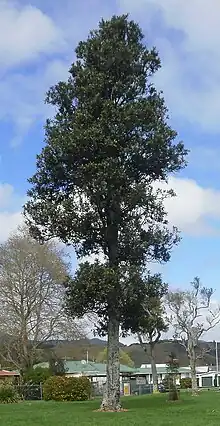Knightia excelsa
Knightia excelsa, commonly called rewarewa (from Māori), is an evergreen tree endemic to the low elevation and valley forests of New Zealand's North Island and Marlborough Sounds (41° S)[2] and the type species for the genus Knightia.[3]
| Knightia excelsa | |
|---|---|
 | |
| Scientific classification | |
| Kingdom: | Plantae |
| Clade: | Tracheophytes |
| Clade: | Angiosperms |
| Clade: | Eudicots |
| Order: | Proteales |
| Family: | Proteaceae |
| Genus: | Knightia |
| Species: | K. excelsa |
| Binomial name | |
| Knightia excelsa | |
_(W3).svg.png.webp) | |
| Knightia excelsa is native to New Zealand[1] | |
| Synonyms[1] | |
| |
Rewarewa grows to 30 m tall, with a slender crown. The leaves are alternate, leathery, narrow oblong, 10 – 15 cm long and 2.5 - 3.5 cm wide, and without stipules. The flowers are 2 - 3.5 cm long, bright red, and borne in racemes 10 cm long. Produces dry woody follicles.
It was called New Zealand honeysuckle by early European settlers but the name has fallen into disuse in preference for the Māori name. Rewarewa flowers are a great source for honey production.
The rewarewa is noted for its timber, which is handsomely figured for interior work although not durable in exposed situations.[4]
.jpg.webp)
References
- "Knightia excelsa (Knight) R.Br". Plants of the World Online. Royal Botanic Gardens, Kew. Retrieved 17 July 2023.
- Meylan, BA; BG Butterfield (1973). "Scanning Electron Micrographs of New Zealand Woods 2. Knightia excelsa R.Br". New Zealand Journal of Botany. XI: 201–12. doi:10.1080/0028825x.1973.10430273.
- "Knightia". Index Nominum Genericorum. International Association for Plant Taxonomy. 9 February 1996. Retrieved 28 June 2008.
- Metcalf, L. J. (Lawrence James) (2011). The cultivation of New Zealand trees and shrubs (Rev. and updated ed.). Auckland, N.Z.: Raupo. ISBN 9780143565611. OCLC 753700257.
External links
![]() Media related to Knightia excelsa at Wikimedia Commons
Media related to Knightia excelsa at Wikimedia Commons
![]() Works related to On the Proteaceae of Jussieu at Wikisource
Works related to On the Proteaceae of Jussieu at Wikisource
- The Royal Society of New Zealand (1989). "Family Proteaceae". Journal of the Royal Society of New Zealand (Volume 12 ed.). Wellington: The Royal Society of New Zealand. Retrieved 28 June 2008.